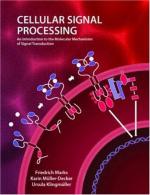|
This section contains 1,961 words (approx. 7 pages at 300 words per page) |

|
Transduction is one of three basic mechanisms for genetic exchange in bacteria. Like transformation and conjugation, transduction allows the movement of genetic information from a donor cell to a recipient. Unlike the other mechanisms, however, transduction requires the participation of a type of virus called a bacteriophage in order to accomplish this movement. While transduction has been studied in the laboratory since the 1950s, more recently scientists have shown that the process also occurs in nature and probably plays an important role in the evolution of bacteria.
While transduction is common to many bacteria (but not all), the processes can be divided into two basic mechanisms. Generalized transduction tends to transfer all bacterial genes with similar frequencies, or number of cells genetically altered as a function of the total number of potential recipient cells. Specialized transduction tends to transfer only specific genes. It is the life cycle of...
|
This section contains 1,961 words (approx. 7 pages at 300 words per page) |

|


